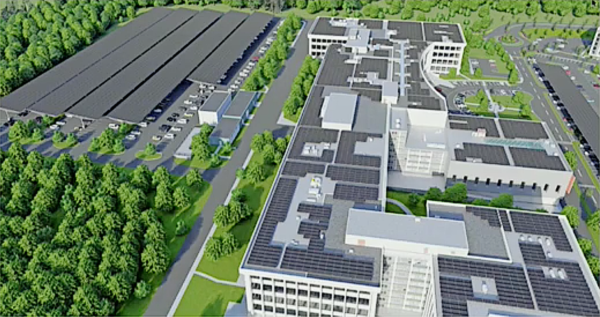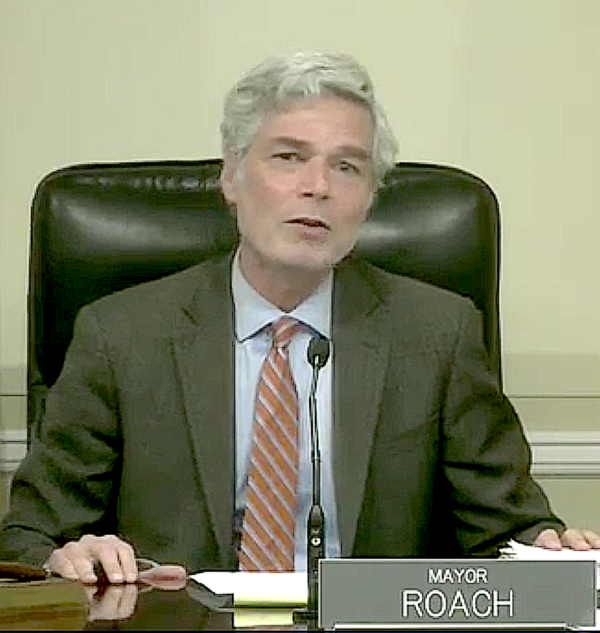White Plains solar project due for Oct. review; council adopts new requirements
A proposal to build a solar electric generating facility at the RPW Group”™s 1133 Westchester Ave. office park, where a multifamily residential project also is being built, is expected to be back before the White Plains Common Council on Oct. 3. Voda Solar Resources LLC is seeking final approvals for an amended master plan and amended site plan for the project. The continued review of the application was delayed pending Common Council action on proposed legislation to add new elements to the city”™s solar regulations, which now have been unanimously adopted.

The changes to the city”™s zoning require specific technical details about an installation to be included in applications for permits to build. The changes also require detailed landscaping and screening plans for systems that use solar panels on canopies over parking spaces. Added is a requirement for an applicant to deposit money into a special account so the city can hire an independent landscape architect, arborist or ecologist to inspect plantings for two years after installation and make sure that the landscaping and screening plans are followed. Amendments to the zoning ordinance provide dimensional standards for solar panels, solar energy equipment and solar parking canopies.
The 54.6-acre site at 1133 Westchester Ave. has a 529,000-square-foot, four-story office building with at-grade parking around the building. An apartment complex is being built on 19.2 acres that were subdivided.
The proposed installation is for carport arrays: solar panels mounted on structural supports over certain at-grade parking areas. Charging stations for electric vehicles also would be provided. In addition, solar panels on the office building”™s roof had been proposed.
Residents had expressed concerns during a public hearing on the 1133 Westchester Ave. proposal that a large-scale solar installation could reduce their property values and add to noise and visual pollution.
As originally proposed, the carports would generate 5.7 megawatts of direct current and the rooftop solar panels would generate another 1.2 megawatts. One megawatt is one million watts of electricity.
Councilwoman Nadine Hunt-Robinson pointed out that one of the changes in the ordinances requires applicants to provide a plan for decommissioning a proposed solar installation should the company go out of business or if the installation needs to be shut down for another reason.
“Yes, we are encouraging solar but at the same time we are going to protect the surrounding community,” Hunt-Robinson said.
Councilwoman Jennifer Puja pointed out that applications for larger solar facilities would undergo review by the Common Council to make sure that the proposal is compatible with the area in which it would be located.
White Plains Mayor Tom Roach said, “We are in a climate crisis and we are at a point in the climate crisis where either we take action or the future is very bleak for our children and for their children. You can see around the world the bizarre weather that”™s occurring: fires in Europe; incredibly high temperatures in places in Europe that far exceed what they would normally see; a record set in London; airport runways melting … planes couldn”™t land because the asphalt was melting.”

Mayor Roach at Common Council meeting.
Roach pointed out that there have been fires in the U.S. and the water level of Lake Mead behind the Hoover Dam has dropped to 27% of capacity.
“It”™s the water supply for 28 million people, so its been shrinking for 20 years and this is caused by climate change, which is caused by us,” Roach said. “When we have an opportunity to do something that does not involve the combustion of fossil fuels I feel that we have to take action.”
Roach said that the tweaks to the city”™s solar ordinance will help screen panel installations but also require that plantings used for screening are native to the area and provide habitats that are appropriate for local animals. He also pointed out that every kilowatt hour of electricity generated from solar is a kilowatt hour that does not need to be generated by a conventional power plant.
“I think that our generation is the last one that has a chance to change the curve,” Roach said. “Under what”™s happening right now, our emissions are on track to rise 16% by the time that we”™re all saying we need to have them cut in half. So, action needs to happen. We, in White Plains, we are taking action.”